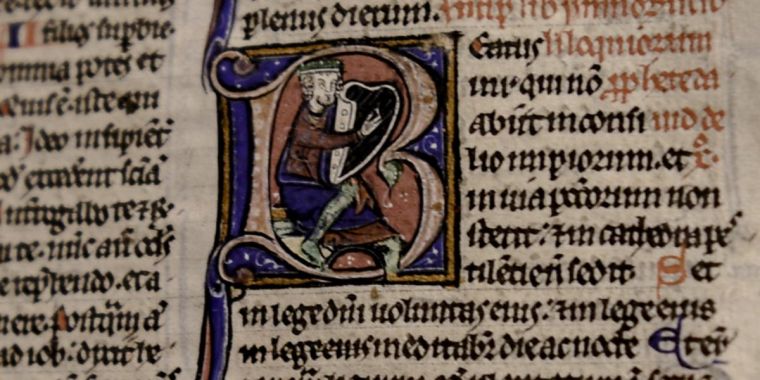
The Lyghfield Bible
A rare medieval Bible that went missing from Canterbury Cathedral 500 years ago has now been safely returned to its former home.
The Lyghfield Bible was part of the extensive book collection owned by the medieval monastic community at the cathedral. When the Reformation spread across Europe in the 16th century, the monastic community was disbanded and many of its books were either lost or destroyed.
Among them was the Lyghfield Bible, named after the 16th century monk at Canterbury Cathedral who once owned it.
The Bible itself dates back to the latter part of the 13th century. It was made using high quality parchment and is beautifully inscribed and decorated.
It is believed that the inscription and illumination of the pocket-sized Bible was done in Paris, which was a centre for such work at the time.
The small Bible was designed for personal use and was returned to the cathedral last month after being purchased at auction from a private seller in London for £100,000.
The cathedral is still trying to solve the puzzle of what exactly happened to the Lyghfield Bible after the monastic book collection was dispersed.
But it is thrilled to have the book back in its hands as it now adds significantly to the mere 30 volumes that the cathedral still has out of the thousands that originally made up the Reformation-era collection.
The cathedral has plans to put the Bible on display in a new exhibition area currently in development.
Canterbury Cathedral Head of Archives and Library Cressida Williams said: 'We are very grateful to the support from funders. It is of the utmost significance to us to have here in our collections a copy of the core Christian text which was owned by one of the last monks of the medieval monastic community.
'The Bible bears witness to the upheavals of the Reformation, a time which defined what the cathedral is today, and will have a key role in telling visitors our story.'
Sir Peter Luff, Chair of the National Heritage Memorial Fund, which provided a grant towards the cost of the Bible, said: 'Not only an incredibly rare book directly linked to one the most turbulent periods of British history, the Lyghfield Bible is also exquisitely beautiful.
'We at the National Heritage Memorial Fund agreed it was imperative it should be saved for the nation and returned home to Canterbury where its important story can be told to future generations of visitors, pilgrims and students.'
This article was originally published in Christian Today and is re-published here with permission.